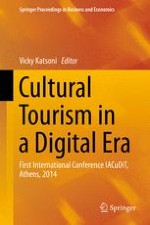2015 | OriginalPaper | Buchkapitel
Game-Based Learning and Lifelong Learning for Tourist Operators
verfasst von : R. Pace, A. Dipace
Erschienen in: Cultural Tourism in a Digital Era
Aktivieren Sie unsere intelligente Suche, um passende Fachinhalte oder Patente zu finden.
Wählen Sie Textabschnitte aus um mit Künstlicher Intelligenz passenden Patente zu finden. powered by
Markieren Sie Textabschnitte, um KI-gestützt weitere passende Inhalte zu finden. powered by
